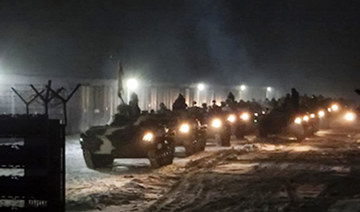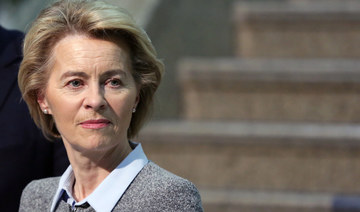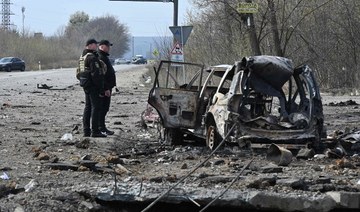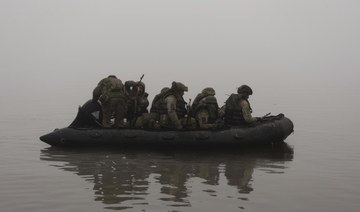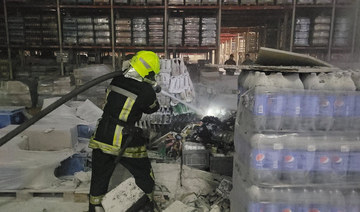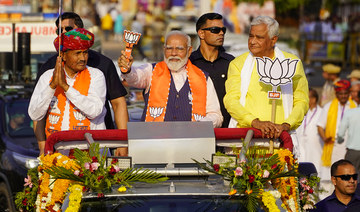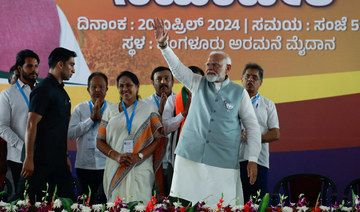MOSCOW: Russia’s top diplomat said Friday that Moscow will not start a war in Ukraine but warned that it wouldn’t allow the West to trample on its security interests, amid fears it is planning to invade its neighbor.
US President Joe Biden warned Ukraine’s leader a day earlier that there is a “distinct possibility” that Russia could take military action against the former Soviet state in February.
“There won’t be a war as far as it depends on the Russian Federation, we don’t want a war,” Foreign Minister Sergey Lavrov said in a live interview with Russian radio stations. “But we won’t let our interests be rudely trampled on and ignored.”
Tensions have soared in recent weeks, and the United States and its NATO allies warily eyed a buildup of more than 100,000 Russian troops near Ukraine, worrying that Moscow was preparing to attack. Russia has repeatedly denied having any such plans, but has demanded that NATO promise Ukraine will never be allowed to join and that the alliance roll back deployments of troops and military equipment in Eastern Europe.
The US and NATO formally rejected those demands this week, though Washington outlined areas where discussions are possible, offering hope that there could be a way to avoid war.
Russia’s official response to those proposals will come from President Vladimir Putin, but the Kremlin has said there was “little ground for optimism.”
Lavrov echoed noted that grim note Friday.
“While they say they won’t change their positions, we won’t change ours,” he said. “I don’t see any room for compromise here.”
Putin opened the weekly meeting of his Security Council on Friday, saying only that it would address foreign policy issues. Kremlin spokesman Dmitry Peskov said that the Russian leader may also discuss his reaction to the US rejection with French President Emmanuel Macron during their video call the same day.
Lavrov noted that the US suggested the two sides could talk about limits on the deployment of intermediate-range missiles, restrictions on military drills and rules to prevent accidents between warships and aircraft. He said that Russia proposed discussing those issues years ago — but Washington and its allies never took them up on it until now.
While he described the US offers as reasonable, he emphasized that Russia’s main concerns are to stop both NATO’s expansion and the deployment of the alliance weapons near Russia’s borders. He noted that international agreements say that the security of one nation must not come at the expense of others’ — and that he would send letters to ask his Western counterparts to address that obligation.
“It will be hard for them to wiggle out from answering why they aren’t fulfilling the obligations sealed by their leaders not to strengthen their security at the expense of others,” he said.
As tensions build, Washington warned Moscow of devastating sanctions if it invades Ukraine, including penalties targeting top Russian officials and key economic sectors. Several senior US officials also said Thursday that Germany would not allow a newly constructed pipeline — which is meant to bring gas directly from Russia — to begin operations if Russia invades Ukraine.
Asked about possible sanctions, Lavrov said that Moscow had warned Washington that their introduction would amount to a complete severing of ties.
While Moscow and the West are mulling their next steps, NATO said it was bolstering its deterrence in the Baltic Sea region, and the US ordered 8,500 troops on higher alert for potential deployment to Europe.
Russia has launched a series of military drills involving motorized infantry and artillery units in southwestern Russia, warplanes in Kaliningrad on the Baltic Sea, and dozens of warships in the Black Sea and the Arctic. Russian troops have also headed to Belarus for sweeping joint drills, raising Western fears that Moscow could stage an attack on Ukraine from the north. The Ukrainian capital is just 75 kilometers (50 miles) from the border with Belarus.
Despite the alarming rhetoric, Ukrainian officials have repeatedly tried to project calm.
Ukraine’s Defense Minister Oleksii Reznikov told parliament Friday that the total number of Russian troops near Ukraine — about 130,000 — is comparable to Moscow’s military buildup in the spring of 2021, when Moscow eventually pulled its forces back after massive military exercises.
“We haven’t observed any events or actions of military character that significantly differ from what was going on last spring,” with the exception of the deployment to Belarus, Reznikov said.
But that has so far not reassured many in the West. Biden warned Ukrainian President Volodymyr Zelenskyy in Thursday’s call that the US believed there was a high degree of likelihood that Russia could invade when the ground freezes and Russian forces could attack Ukrainian territory from north of Kyiv, according to two people familiar with the conversation who were not authorized to comment publicly.
While concerns rise about an invasion, Ukraine is already beset by conflict. Following the 2014 ouster of a Kremlin-friendly president in Kyiv, Moscow annexed Ukraine’s Crimean Peninsula and backed an insurgency in the country’s eastern industrial heartland. Fighting between Ukrainian forces and Russia-backed rebels has killed over 14,000 people, and efforts to reach a settlement have stalled.
Russia says it won’t start a war as Ukraine tensions mount
https://arab.news/vcftt
Russia says it won’t start a war as Ukraine tensions mount
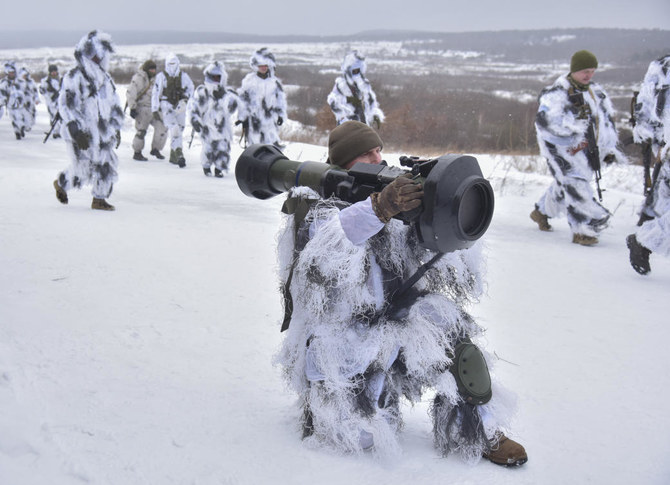
- US President Joe Biden warned Ukraine’s leader a day earlier that there is a “distinct possibility” that Russia could take military action
- “There won’t be a war as far as it depends on the Russian Federation, we don’t want a war,” Foreign Minister Sergey Lavrov said
Sweden to send NATO troops to Latvia next year: PM
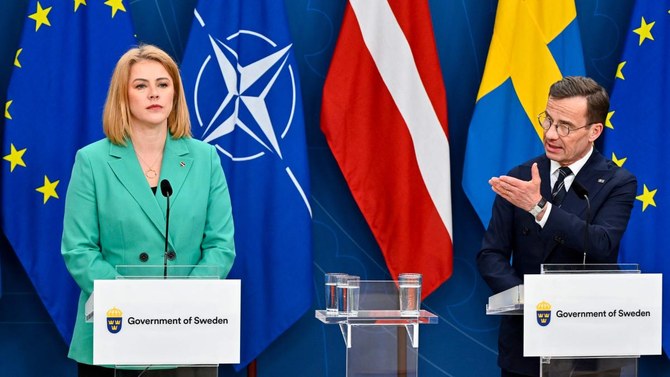
- The Swedish troop contribution was the first to be announced since the Scandinavian country joined NATO in March
- The battalion would be comprised of around 400 to 500 troops
STOCKHOLM: Sweden will next year contribute a reduced battalion to NATO forces in Latvia to help support the Baltic state following Russia’s invasion of Ukraine, Prime Minister Ulf Kristersson said Thursday.
The Swedish troop contribution was the first to be announced since the Scandinavian country joined NATO in March.
Kristersson had in January announced that Sweden would likely send a battalion to take part in NATO’s permanent multinational mission in Latvia, dubbed the Enhanced Forward Presence, aimed at boosting defense capacity in the region.
“The government this morning gave Sweden’s armed forces the formal task of planning and preparing for the Swedish contribution of a reduced mechanized battalion to NATO’s forward land forces in Latvia,” Kristersson told reporters during a press conference with his Latvian counterpart Evika Silina.
He said the battalion, which will be in Latvia for six months, would be comprised of around 400 to 500 troops.
“Our aim is a force contribution, including CV 90s armored vehicles and Leopard 2 main battle tanks.”
“We’re planning for the deployment early next year after a parliament decision,” he said.
UK police make fourth arrest after migrant deaths off France
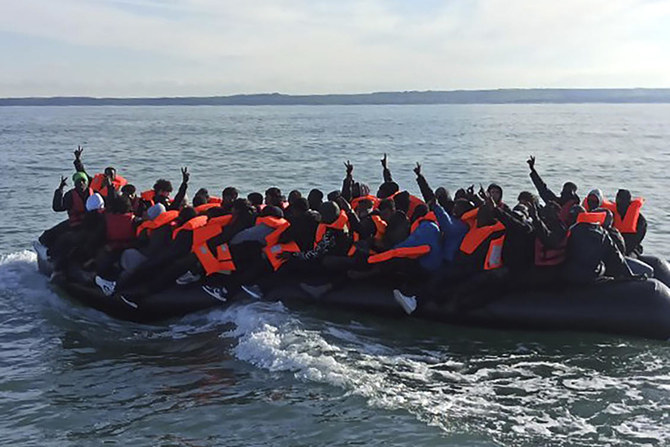
- NCA said it arrested an 18-year-old from Sudan late Wednesday on suspicion of facilitating illegal immigration and entering the UK illegally
- The latest arrest took place at Manston in Kent, southeast England, and the suspect was taken into custody for questioning
LONDON: UK police said Thursday that they had arrested another man after five migrants, including a child, died this week trying to cross the Channel from France.
The National Crime Agency (NCA) said it arrested an 18-year-old from Sudan late Wednesday on suspicion of facilitating illegal immigration and entering the UK illegally.
The arrest came as part of an investigation into the Channel small boat crossing which resulted in the deaths of five people on a French beach on Tuesday.
The NCA detained two Sudanese nationals aged 19 and 22, and a South Sudan national, also 22, on Tuesday and Wednesday, also on suspicion of facilitating illegal immigration and entering the UK illegally.
The 19-year-old has been released without charge, and is now being dealt with by immigration authorities, said the NCA.
The latest arrest took place at Manston in Kent, southeast England, and the suspect was taken into custody for questioning.
Three men, a woman and a seven-year-old girl lost their lives in the early hours of Tuesday in the sea near the northern French town of Wimereux.
They had been in a packed boat that set off before dawn but whose engine stopped a few hundred meters from the beach.
Several people then fell into the water. About 50 people were rescued and brought ashore but emergency services were unable to resuscitate the five.
Fifteen people have died this year trying to cross the busy shipping lane from northern France to southern England, according to an AFP tally.
That is already more than the 12 who died in the whole of last year.
Belgium summons Israeli ambassador over aid worker’s death
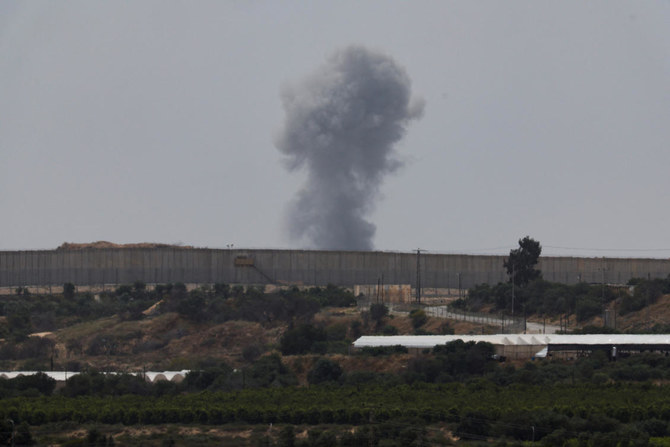
- Abdallah Nabhan, 33, along with his seven-year-old son, 65-year-old father, 35-year-old brother and six-year-old niece, were killed in Israel strike
- The airstrike hit the family home where 25 people were sheltering
BRUSSELS: Belgium said Thursday that it would summon Israel’s ambassador to explain the death in a Gaza airstrike of an aid worker with its Enabel development agency, as well as members of his family.
“Bombing civilian areas and populations is contrary to international law. I will summon the Israeli ambassador to condemn this unacceptable act and demand an explanation,” Foreign Minister Hadja Lahbib said on X.
Enabel said in a statement that Abdallah Nabhan, 33, along with his seven-year-old son, 65-year-old father, 35-year-old brother and six-year-old niece, were killed “after an Israeli airstrike in the eastern part of the city of Rafah.”
An Enabel employee & his family have been killed in Gaza. We express our solidarity with his family & colleagues.
— Hadja Lahbib (@hadjalahbib) April 25, 2024
Bombing civilian areas & populations is contrary to international law. I will summon the Israeli ambassador to condemn this unacceptable act & demand an explanation.
The airstrike hit the family home where 25 people were sheltering, including people displaced by the Israeli military operation in Gaza, Enabel said.
It said that Nabhan, who had worked on a Belgian development project helping young people find jobs, and his family were on a list Israel had of people eligible to exit Gaza, but that they were killed before being granted permission to leave.
Enabel’s chief, Jean Van Wetter, called their deaths “yet another flagrant violation by Israel of international humanitarian law.”
The health ministry in Gaza, run by the Hamas militant group, says more than 34,000 people have died in the war being waged in the Palestinian territory, most of them women and children.
Israel is conducting airstrikes and ground operations there in retaliation for a Hamas attack on October 7 that killed around 1,170 people in Israel, according to an AFP tally of Israeli figures.
Belgium, which currently holds the EU presidency, is among the European countries most vocal in condemning Israel’s operation as disproportionately deadly for Palestinian civilians.
Ukraine, Russia exchange fire, at least seven dead
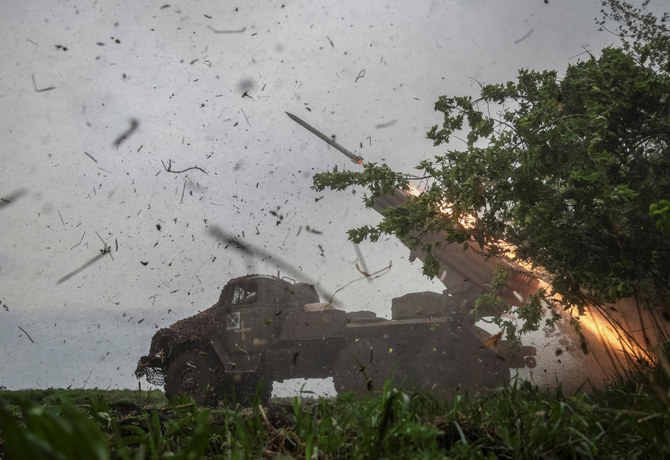
- The uptick in civilian deaths came as Russian forces are pressing in hard in the eastern Donetsk region of Ukraine
- A Ukrainian attack drone left two dead in Zaporizhzhia and two more were killed by Ukranian artillery fire in Kherson
MOSCOW: Ukrainian and Russian forces exchanged drone and artillery fire on Thursday, leaving at least seven dead, regional officials on both sides of the frontline announced.
The uptick in civilian deaths came as Russian forces are pressing in hard in the eastern Donetsk region of Ukraine, ahead of events in Moscow on May 9, hailing the Soviet Union's victory in World War II.
A Ukrainian attack drone left two dead in the southern region of Zaporizhzhia and two more were killed by Ukranian artillery fire in the southern Kherson region, officials said.
The Kremlin claimed to have annexed both regions in late 2022 even though Russian forces are still battling to gain full control over them.
"A man and a woman were killed as a result of a strike on a civilian car. Their four young children were orphaned," the Russian-installed head of Zaporizhzhia, Evgeny Balitsky, wrote on social media.
He said the children would be taken into care and provided with psychological assistance.
The Russian head of the Kherson region, Vladimir Saldo, said separately that two more people were killed by Ukrainian fire in the village of Dnipryany.
The two frontline regions saw intense bouts of fighting in 2022 and the summer of 2023, when Ukraine launched a counteroffensive that failed to meet expectations in Zaporizhzhia.
The brunt of the fighting has since moved to the eastern Donetsk region, which is also claimed by Moscow as Russian territory.
The Ukrainian head of the Donetsk region, Vadim Filashkin, said three people had been killed in separate bouts of shelling in the villages of Udachne, where two people were killed, and in Kurakhivka, where one person was killed.
"The final consequences of the shelling have yet to be determined," he said.
Keralites in Gulf take ‘vote flights’ to join India’s mammoth polls
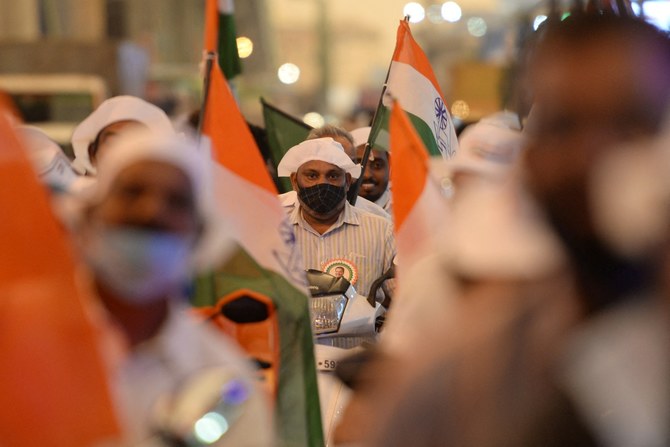
- ‘Vote flights’ are special chartered flights bringing Keralites home to cast ballots
- Kerala is the single main place of origin of Indian expats living in Gulf countries
NEW DELHI: Tens of thousands of Keralites working in Gulf countries are flying home to cast their ballots as the southern Indian state opens for voting on Friday in the world’s biggest general election.
India’s seven-phase polls started on April 19 and take place over the next six weeks, with more than 968 million people registered to vote.
Some states are completing the process in a day, and others have it spread out in several phases. Kerala is joining other 12 states, which according to the schedule go to the polls on April 26.
Indian nationals living overseas have been allowed to vote since 2011 and have to register with both the Election Commission of India and Indian embassies in their countries of residence. Their names will then appear on the voters’ list, but to cast their ballots, they still need to be physically present in their constituencies.
India has one of the world’s largest diasporas, especially in GCC countries, where at least 9 million Indian expats live and work. The southwestern coastal state of Kerala is the single main place of their origin. Some 3.5 million Keralites reside in Saudi Arabia, Oman, Kuwait, Qatar, Bahrain and the UAE.
“I think about 30,000 people have come from Saudi Arabia alone to vote. Not all of them have come on ‘vote viman’ (vote flights). Some have also come by regular flights,” said Iqbal Cheri, a marketing professional working in Dammam, who reached Kerala on Thursday.
Cheri referred to the flights that have been bringing citizens home to participate in Friday’s polls.
“They bring voters only and they are mostly chartered flights,” he said. “We have come here to vote and save our democracy and secularism. It’s an important election and we all need to vote to save the nation.”
His compatriot, Shareef Chola Paramdil, who works as a marketing head of a hospital in Dammam, said these election flights have been bringing Saudi Arabia-based Kerala voters home for the past few days.
“Last week, also three chartered flights came from Saudi Arabia,” he said.
“People who come on the chartered flights pay less compared to the regular flights, as group booking brings down the fare. Besides, these people don’t get more than a few days of leave. So, they come and cast their votes and leave the next day.”
There are 543 contested seats in the lower house of parliament. The party or coalition that wins at least 272 is going to form the government. The state of Kerala will contribute 20.
For Paramdil, the election is particularly important as a Muslim because incumbent Prime Minister Narendra Modi and his ruling Bharatiya Janata Party have been accused by the opposition and minority groups of marshaling majoritarian Hindu sentiment.
Critics say that India’s tradition of diversity and secularism has been under attack since Modi took power a decade ago and that his party has been fostering religious intolerance and discrimination.
“We want a government that does not discriminate in the name of religion, and we have been troubled by the politics of division that the government in Delhi has been practicing ever since it came to power in 2014,” Paramdil said.
Both Keralite Muslims and Hindus — like Gokul Padnabhan, a Kuwait-based professional in the oil and gas industry — see the election as an important exercise of their democratic rights.
“It’s very important to be here this time. That’s why I came for the vote,” Padnabhan said. “The vote will help us find the right person to rule us for the next five years.”
One of the organizations helping expat voters charter flights in Gulf countries is the Kerala Muslim Cultural Centre, an overseas wing of the Indian Union Muslim League.
“I feel around 100,000 people have come from the Gulf region to vote in this election,” said Ahamed Saju, head of the IUML’s student federation.
“Why they came is because this is a very crucial election this time ... Each and every vote is important. So, they thought that this time to protect our democracy, protect our constitution, protect our values and protect our secular credentials and the secular fabric of the country.”



